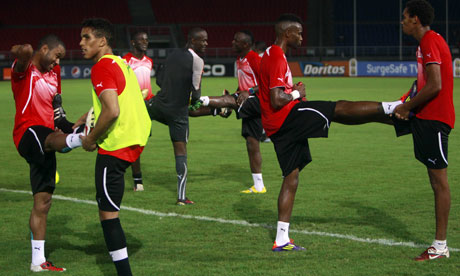
An offer of $1m (£644,548) to Equatorial Guinea's footballers to win a big match has been condemned by anti-poverty and corruption campaigners.
The bonus will be shared by the national team if they beat Libya on Saturday in the Africa Cup of Nations, which Equatorial Guinea is co-hosting. The players will also be awarded $20,000 for every goal they score.
The cash prize has been put up by Teodorin Obiang, the playboy son of the country's autocratic president, Teodoro Obiang, according to the team liaison officer David Mosiwy.
"This is a personal gesture – there is no official standing to the prize," Mosiwy told the Associated Press. "The news has given the players an injection of enthusiasm and morale. It shows the popular support everybody has for the team."
Equatorial Guinea, who qualified as co-hosts with west African neighbours Gabon, have never appeared at the Africa Cup of Nations before. The team is ranked 151st in the world, behind Yemen and Samoa.
But the win bonus drew heavy criticism, given the plight of Equatorial Guinea's people: seven in 10 live below the poverty line and one in five children dies before their fifth birthday.
Adrian Lovett, Europe director for the global anti-poverty campaign One, said: "It is remarkable that the president's son has managed to find such a large amount of cash to help motivate his team to win. But the question must be, where has this money come from? Football is not just about winning. It's about playing by the rules."
Equatorial Guinea has huge oil wealth. One has called on the European Union to adopt rules that would force many of the multinational companies operating there to publish payments they make to the government for the right to extract oil.
Lovett added: "The secrecy that infects every aspect of public life in Equatorial Guinea shows why we need mandatory disclosure laws in Europe that will lift the lid on the amount of money a government receives from the sale of its natural resources.
"Such laws will shine a light on the secrecy that facilitates government corruption and the mismanagement of funds that should be spent to reduce poverty and improve the lives of ordinary people."
Last year Teodorin Obiang was accused by the US government of looting more than $100m (£63m) from state coffers to go on a shopping spree that included a Malibu mansion, a Gulfstream jet and the late Michael Jackson's white, crystal-covered glove.
The tiny country has enjoyed a 10-year construction boom fuelled by oil and gas reserves but attracted criticism for its lack of democracy and poor human rights record. Unemployment is estimated at around 22%, while Unicef lists life expectancy at just 51.
Tutu Alicante, executive director of the governance watchdog EG Justice, said: "The government of Equatorial Guinea hopes that the recently completed luxury hotels, golf resorts and shiny monuments will disguise the grinding poverty that dominates the lives of most people in the oil-rich nation. They must not be allowed to get away with this deception."

